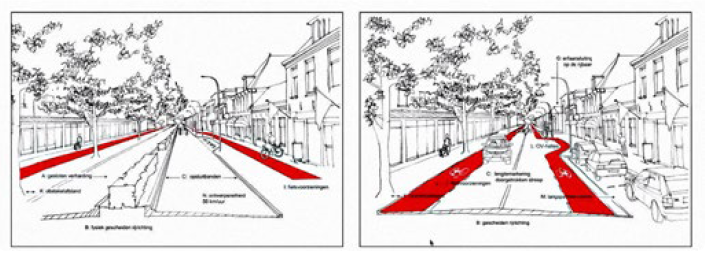The pandemic and sustainable transportation
By Lenka Loučková | The Royal Netherlands Embassy in Bratislava
COVID-19 has changed many things and it is likely to reshape the way we think about the world. The pandemic not only magnified structural problems in key sectors, but it also attracted attention to environmental topics. The vulnerability of our interconnected societies to unexpected shocks has become painfully clear. At the same time, many (re)discovered the importance of nature and the advantages of a healthy lifestyle. Many also gained new perspectives on the cities they live in.
Cycling in cities has been gaining attention for a long time. The pandemic now gives us an unprecedented opportunity to rethink how we move around cities and to advocate for more sustainable transportation.
Ideal model (left), Minimal model (right). Source: Mobycon
With this in mind, we joined forces with Ekopolis and the Dutch Cycling Embassy to bring Dutch cycling expertise to Slovakia. The first webinar focused on how to gain support for cycling from different stakeholders. Ruben Loendersloot (Loendersloot Groep) highlighted the interconnectedness of cycling with other characteristics such as quality of life, health and social aspects. In March, Otto Cazemier and Eveline de Jong (Mobycon) provided many practical examples of how to organize streets and roads with non-motorized transportation in mind. The third webinar in April focused on bicycle parking, a neglected issue in Slovakia. Simone Jorink (Movares) presented examples of sophisticated parking systems and smaller scale solutions.
The presentations and recordings are available on the Ekopolis website.
The underlining messages of all the discussions were the key role of cooperation and inclusion, as well as a sense of urgency. The best time to act is now. Then again, we also have to keep in mind that a significant shift to sustainable mobility, both technical and societal, is a long process. The Netherlands can provide best practices, answers and solutions. However, it is also important to realise that just a simple copy&paste solution isn’t likely to work, as local context is crucial.


